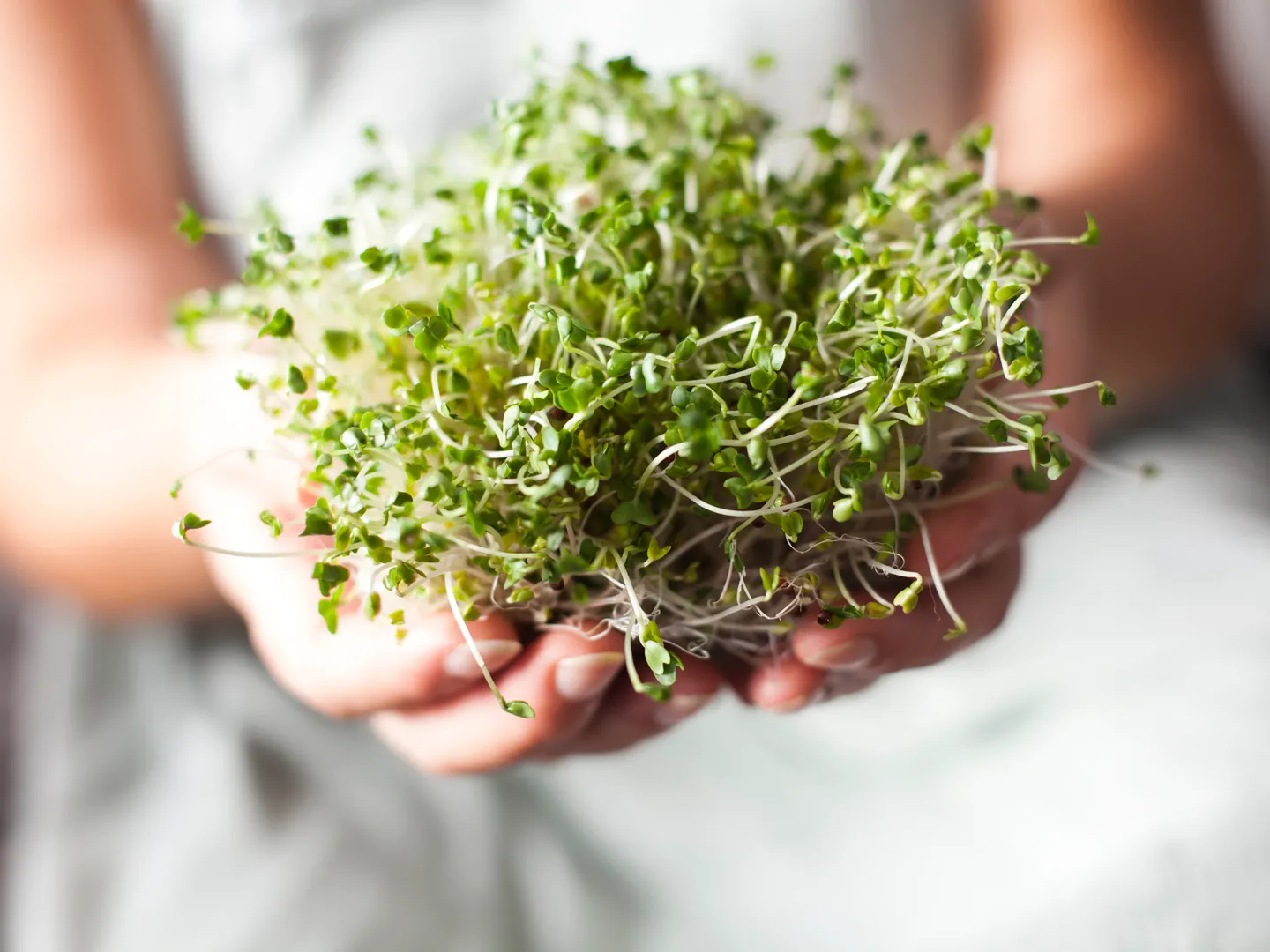Cancer-Fighting Benefits of Broccoli Sprouts

Whenever we think of sprouts, the first thing that comes to mind would be tender and delicate bean sprouts—the kind we enjoy in soupy foods such as Pho or added in stir-fries for extra flavor.
We are well aware of how nutritious these can be, despite their size. But it isn’t just bean sprouts that can pack a punch when it comes to health benefits. Just take broccoli sprouts for example.
In a 1997 piece published by the New York Times, its cancer-fighting compounds were given the spotlight. However, a lot of people tend to pass on it given the fact that it isn’t as accessible as the mature broccoli vegetable we can readily purchase from any grocery or farmer’s market. That said, it’s about time you have this food a try—especially since you can actually grow it right in the comfort of your own home!
The Essentials – How Do Broccoli Sprouts Benefit Us?
Understandably, it is easy to assume that these sprouts are no different from their more mature counterpart when it comes to nutritional content. However, the two have major differences—whilst mature broccoli has a higher amount of vitamins K and C its sprouts do have an abundance of glucosinolates. But glucosinolates are just one thing, it’s what happens to this compound inside of our bodies that truly count.
Brassica veggies, which the family broccoli sprouts are from, along with a few other cruciferous varieties all contain myrosinase. This is an enzyme that functions in the same way as our gut bacteria and helps in breaking down glucosinolates into a more usable form. One such form is isothiocyanates. This is the compound that really gets things going—it is known to activate other enzymes that trigger the transformation and/or the removal of xenobiotics (aka disease-causing compounds) from our bodies.
You don’t even need a lot of isothiocyanates in order to activate this “host defense mechanism”. Having just a small amount of the compound is enough to push your body into action, utilizing its own natural disease-fighting power.
The benefits of broccoli don’t stop there, however—let’s move on to yet another compound called glucoraphanin. This is the glucosinolate precursor to sulforaphane which is yet another potent cancer-preventing compound that also has the ability to fight off the disease. It supports the functions of different bodily systems, including the respiratory system, our bones, and the heart. It also boosts our immunity, allowing the body to fight off common infections. Other ways it could benefit us, include: protecting the brain after a serious injury, detoxifying our bodies of environmental toxins, and even aids in combating autoimmune disease.
All that sounds too good to be true, but that’s barely touching the surface when it comes to the importance of broccoli sprouts when it comes to our health and well-being.
Let’s Talk SCIENCE – Broccoli Sprouts Can Help Prevent Different Types of Cancers
– Breast Cancer
Trials on mice allowed for the discovery that sulforaphane is capable of restricting the growth of breast cancer stem cells, suggesting that adding broccoli sprouts to one’s daily diet is a beneficial method of protection against the disease. This same trial was also done in humans, finding positive results but still lacking significant changes when it comes to the tumor biomarkers used for measuring the improvement of cancer development.
– Prostate Cancer
In studies done on its effects on both humans and animals, results show that both mature broccoli and its sprouts do have potent effects when it comes to this type of cancer. The selenium content for both was shown to help restrict the protein NGK2D ligand, a protein known to impact the immune system and causes it to overact, which then leads to different cancers including that of the prostate, melanoma, and leukemia.
– Colon Cancer
A lab study, along with tests done on mice, was able to conclude that the sulforaphane from broccoli sprouts was potent enough to cause permanent DNA breakage and cell death in colon cancer cells. The great thing about this is that it specifically targeted the “bad/unhealthy cells” and left the healthy ones untouched.
– Lung Cancer
In 2005, a mouse study looked into sulforaphane’s ability to help with preventing lung cancer caused by tobacco carcinogens. This yielded positive results as well, leading scientists to conclude that regular intake of food rich in the compound can prevent the occurrence of lung cancer in both current and ex-smokers even if they already have early lung lesions.
– Throat Cancer
Different researchers from John Hopkins University and the University of Pittsburgh presented their review detailing how broccoli sprout extracts can help fight oral cancer, specifically ones occurring in the head and neck. This was tested on mice and later on, in humans as well—showing that it is tolerable for the latter as well. More studies need to be done on its effects on more high-risk human volunteers, however.
Other Known Health Benefits
Broccoli sprouts might be better known for how effective they can potentially be in preventing different types of cancers, but this isn’t the only way they can benefit our health. Whilst studies are continuously being done to learn more about its capabilities, here are other known ways this amazing food can improve our overall well-being.
– Heart Health Benefits
The most common denominator in all the different studies done on the effects of broccoli sprouts on heart health would be lowered blood pressure and triglyceride levels. However, it is also possible that these sprouts can also benefit those who have experienced myocardial reperfusion injury. Effectively aiding in the organ’s recovery and preventing cell death, as well as oxidative stress.
– Boosts Bone Strength
Osteoporosis is a problem, not just for the elderly but for some middle-aged people as well. Whilst there are supplements that can help prevent or delay the process, including broccoli sprouts in your daily diet has proven to be very effective for this purpose as well. Its sulforaphane content can help restrict inflammation and different molecular processes associated with forming osteoblasts—a catalyst for osteoporosis.
– Can Be Effective Against H. Pylori Infection
It might famous for being “the most successful pathogen in human history”, but animal and human studies show that the tiny broccoli sprout can actually temporarily suspend this infection in some patients—with no risk of side effects. Whilst it was not able to eliminate the infection, it can help with protecting the gastric lining from oxidative stress caused by it. Prevention is also another function it can serve, but more studies need to be done on this.
Broccoli Seed Oil
Another broccoli byproduct, the seed oil is just as potent as the sprouts and mature vegetables. It is known to help prevent certain cancers, particularly skin cancer as it helps with preventing UV damage. Aside from this, it is also known to aid with other aging-related ailments such as bone density and health, as well as skin degradation.
Topically, it can be used to care for both skin and hair—making it an all-natural substitute for retinol and silicone-based beauty products. In the same manner as sunflower oil, it is also a nourishing moisturizer for the skin. Needless to say, the entire plant—from its seed to maturity—can provide us with endless health benefits. There’s really no reason to not give it a try!
Cultivating and Growing Broccoli Sprouts
We’ve touched on the fact that broccoli sprouts aren’t as readily available as their mature counterpart—this is one reason why most people don’t include these in their diets. However, there is a way to make eating it more convenient. Not to mention, more affordable as these sprouts can be easily grown at home. It takes little to do so and you’ll still be reaping all of its health benefits.
You’ll need:
– A big jar with a sprouting lid
– Broccoli seeds (can be easily bought online or in local stores)
– Purified water
Here’s how:
– Much like conventional seed sprouting, you’ll need to add about 2 tablespoons of your seeds to the jar. Cover this with warm purified water—only a few inches as you don’t want to “drown” the seeds. Allow this to soak overnight then drain the water.
– For the next 5 days, wash the seeds with purified water about two times per day. Make sure the water is drained after every rinse to keep the seeds from going bad. Keep them in a warm and dark environment to hasten the sprouting.
– You should begin to see the early beginnings of a sprout over the next few days, but don’t harvest them just yet. Wait until you see them grow to about an inch and a half. They should have developed leaves by then. Now you can expose them to some sunlight, but still continue the water and rinse process.
– They are ready for picking after the leaves have turned a darker color and have grown to an inch in length.
PRO-TIP: If you leave them in a hot and dry place, the rinsing process becomes even more important to ensure they don’t end up withering and dying. Note that for first-time growers, this can be a trial-and-error situation but don’t fret—you’ll eventually get the hang of it after some time. Broccoli seeds are also pretty inexpensive so you can stock up on them and continue trying until you succeed.
